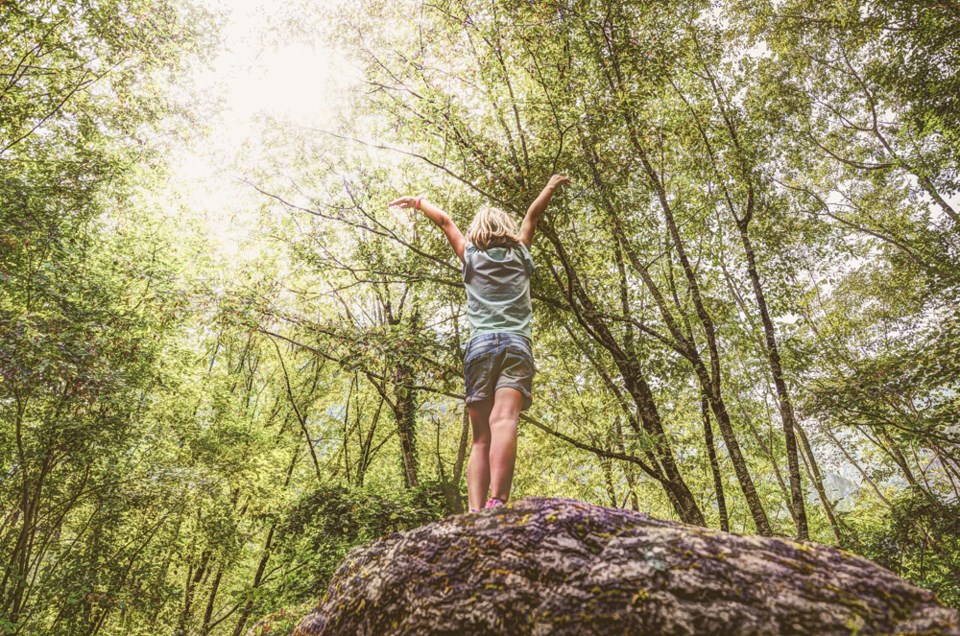Caring about the environment is a given in Squamish. The landscape is why most people are here, after all.
With 20 per cent of the Squamish population under 14, according to the Squamish Community Foundation's 2017 Vital Signs Report, The Chief caught up with Dr. Ashley Miller, a child, and adolescent psychiatrist, for a chat about how to talk about the climate crisis.
What follows is an edited version of that conversation.
Q: With all the talk about a climate crisis, how should parents talk to preteens about it?
A: Parents can absolutely help kids handle any difficult news with hope and optimism and certainly the climate crisis is one of those things.
What helps, in general, is giving kids a sense of optimism. So, making sure to not always show them the horrible news. Know your own child and her capacity to handle information. Give them what is age and their own sensitivity-appropriate information and make sure they are exposed to good news about people who are doing great things — the scientists, environmental agencies and community efforts. Parents can show that they have trust, as a parent, in our human capacity to solve these problems. Then parents can help them develop their own action plans, ideally as a family so that children see parents are taking action with very concrete, specific things. This gives children a sense of agency. So, maybe even developing their own sense of purpose and meaning around what they are doing and goals for themselves. That really improves well-being.
Q: The big issue everyone is talking about, including kids in town, is the UN Intergovernmental Panel recently saying there's 12 years to limit climate catastrophe. To a child, that must be quite frightening. In that specific case, how would you advise parents couch that information?
A: I think to couch it in, "Humans are amazing. We have been able to solve really big problems. We have come together to work on things before, throughout history. Look at all these groups and amazing projects." So to be realistic, but hopeful.
Yes, it is a short timeline, but look at what we can do. Focus more on the practical, and the day-to-day rather than on the more apocalyptic. We know that doesn't help. We know that for adults as much as for kids, a sense of realism and a sense of urgency is necessary, but overwhelming people or creating a sense of helplessness is counterproductive.
Q: Can you elaborate on what happens when this type of news overwhelms people?
A: There was a Swedish study from 2012 ("Young People and Climate Change Communication," by Maria Ojala) where the researcher looked at children and their style of coping specifically around climate change. It is actually the children who make meaning out of it that fared the best emotionally. That including doing things like looking at their own goals, seeing the opportunity in a challenge, trusting in the good of humanity.
Q: Every generation has a version of this fear, it seems. For my generation, it was being worried about being vapourized in a nuclear war. Before that, people worried about the Vietnam War and before that the Second World War. Is this modern fear any different because of social media?
A: The more aware kids and the more anxious kids may become more anxious about whatever the threat is of the current generation. I am sure the more media you see, especially if it is unfiltered media, that makes a difference. Before, we used to have the TV on for the whole family to watch together a few hours a day. Now, kids have access to things on their own screens, without adult supervision and they can easily overwhelm themselves with that kind of content, for sure.
Q: And what about for parents who may be doing the opposite and not talking about climate or other environmental issues and thinking their kids don't have that stress?
A: Kids are exposed to things at school, through peers, through media — that is how it has always been. Parents can help mitigate it by showing positive coping. A lot of this comes down to what conversation do you have in the car — or hopefully out on your bikes — and around the dinner table. How are parents filtering this information? How are teachers helping kids think of productive action they can take?
Q: It isn't always easy to tell when a child is overwhelmed by something, so what should parents watch for?
A: Environmental issues go into the big bag of things kids can feel stressed about. If kids are more irritable, refusing to do things, having sleep problems, complaining about stomach aches and headaches — those are typical signs of anxiety. The truth is the things that affect kids most are the things that are right in front of them: family stress, school stress, peer stress. But those aware kids who have always been worried about earthquakes and natural disasters will be really worried about climate change because they are aware. Often, the smart, aware, creative and imaginative kids are more anxious. We need to give them something really positive to hook their imagination onto so they can put all that great creative skill into action as opposed to worrying.

Q: Here, students are starting to have weekly protests. For kids who want to be involved, isn't that a positive outlet?
A: Absolutely. And there is a certain point where you say what is anxiety and what is just a normal response to a threat? Fear is not anxiety. And it can be helpful and motivating. It is when it goes overboard to paralysis as opposed to motivating positive change — or the child becomes so distressed that they are not enjoying life or functioning in other ways — then, they have tipped the balance.
Q: Lots of people around the world — and throughout history —have lived in small spaces with their families. For environmental and affordability reasons, this is becoming more prevalent here in Squamish with van lifers and tiny home dwellers. Is there anything parents, who are new to this way of living, may want to think about?
A: In cultures where there are very small living environments, teenagers often end up with their own separate dwelling because of their need for privacy, autonomy, which is developmentally normal. So, I guess I would say that may be something that needs to happen eventually.
Q: What age could you start talking to children about helping the environment?
Q: Little kids can help in little ways. They can pick up bottles for recycling, they can help start a garden, they can compost. It is really in the pre-teen and teen years kids start to be more aware of this on a global scale and they could start fundraising or taking on little community action projects through their school or neighbourhoods, for example.
Q: Is there anything else specifically about the issue of talking to kids about climate change you want to say?
A: When the whole family can spend time in nature as a family — which I am sure is not a problem in Squamish — and the whole family can manage stress together through positive action, that is the whole family coping.



